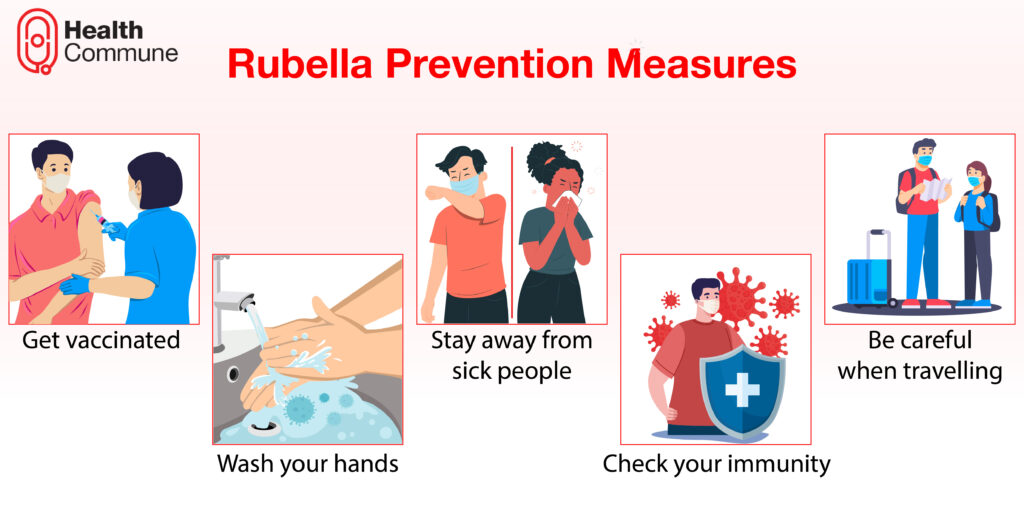What is rubella?
Rubella, commonly known as German measles or three-day measles, is a viral infection caused by the Rubella virus (RuV). This illness is characterised by a distinctive rash that spreads across the body. While it primarily affects children, adults can also be susceptible.
Generally, rubella is considered a mild and non-threatening condition. However, it can pose significant risks when contracted by pregnant women, potentially leading to severe complications for the unborn baby.
Are rubella and measles the same?

What are the symptoms of rubella?
In some individuals, rubella does not show any symptoms. Signs and symptoms are usually seen 2-3 weeks after the exposure and include:
- Low fever
- Pink rash, initiating on the face and neck and spreading throughout the body
- Swelling of lymph glands behind the ears and in the neck.
- Mild conjunctivitis
- Headache
- Runny nose
- Arthritis and painful joints, more commonly observed in women
If a woman contracts rubella during pregnancy, there is a 90% likelihood of transmitting the virus to her unborn child, causing congenital rubella syndrome.
What is congenital rubella syndrome?
If a woman becomes infected with the rubella virus during pregnancy, it can be transmitted to the child, leading to a condition known as congenital rubella syndrome (CRS). CRS can have serious consequences, including miscarriage, death of the foetus, and severe birth defects for the baby. If the foetus is exposed to rubella within the first 12 weeks of pregnancy, it may lead to hearing problems, eye issues, intellectual disability, and damage to the spleen, liver, and heart. The impact is generally milder if rubella exposure occurs between 12 and 20 weeks of pregnancy. After 20 weeks of pregnancy, there is typically no associated risk of problems.
How does rubella spread?
How long does rubella last?
How many days do people remain contagious?
What are the complications of rubella?
Rubella can cause joint pain, especially in adolescents and adult women, which may last for one month. It might affect the wrists, fingers, knees, and ankles.
If a pregnant woman gets rubella, it can lead to serious complications like miscarriage or birth defects in the baby. The chance of having these problems is highest if the woman gets rubella in the first 12 weeks of being pregnant.
Other rare issues that can come with rubella include problems with blood cells, heart inflammation, liver problems, inflammation of the testicles, eye issues, and problems with the nervous system.
How is rubella diagnosed?
Your doctor will ask about your symptoms medical history and perform a physical examination. They may examine your blood, urine, or mucus from your nose or throat. Your doctor may advise certain specific tests to confirm the diagnosis of Rubella, if there is a suspicion of the infection. These include-
Blood test: Blood tests are conducted to detect the presence of specific antibodies to the rubella virus. The most common tests include:
IgM Antibody Test: This test is used to detect recent or acute rubella infection.
IgG Antibody Test: This test determines whether a person has immunity to rubella due to past infection or vaccination.
Urine test: A urine test may also be conducted. Your healthcare provider might collect a sample of your urine to check for signs of rubella.
Nasal or throat swabs: A swab will be used by your provider to collect a sample from your nose or throat.
What is a positive rubella test in pregnancy?
How is rubella treated?
The treatment mainly includes using medications like non-steroidal anti-inflammatory drugs (NSAIDs) to relieve symptoms like fever and joint pain. However, there is no specific medicine for rubella treatment.
For pregnant women, the treatment depends on when the infection started:
If it happens before 18 weeks of pregnancy, there is a high risk of problems for the baby. In such cases, the option of ending the pregnancy might be considered, following laws.
If it happens after 18 weeks, the pregnancy can continue with careful monitoring through ultrasound and special care for the baby after birth.
You will also be asked to quarantine yourself to prevent the infection from spreading.
How is rubella prevented?
To prevent rubella:
Get vaccinated: Make sure you and your family get the MMR vaccine (measles, mumps, and rubella vaccine). It is a safe vaccine and protects against three infections- rubella, measles, and mumps. If you are planning to have a baby, get vaccinated before pregnancy.
Wash your hands: Wash your hands frequently with soap and water, especially after using public restrooms.
Stay away from sick people: Avoid close contact with sick individuals, and ask them to cover their mouth and nose when coughing or sneezing.
Check your immunity: Confirm with your doctor that you are up-to-date on vaccinations. They can do a blood test if needed.
Be careful when travelling: If you are travelling internationally, make sure you are protected against rubella.
By following these steps, you can help protect yourself and others from rubella.
What rubella vaccines are available?
At what age is vaccination recommended?
MMR Vaccination
- The first dose of the MMR vaccine is recommended at 12-15 months of age
- The second dose is given at the age of 4 to 6 years.
R-Vac is a separate vaccine available for preventing rubella. It is recommended for:
- All girls at puberty and above
- All women of childbearing age if the vaccine was missed earlier. Pregnancy should be delayed for at least 28 days after R-Vac
- After the delivery of the baby
It is also advisable for males to get vaccinated, as they can potentially transmit the virus to females in their family.
Is the rubella vaccine safe, and how long does it protect against Rubella?
Can pregnant women be vaccinated?
References:
Rubella (German measles) in pregnancy. Paediatr Child Health. 2007 Nov;12(9):798-802. doi: 10.1093/pch/12.9.798. PMID: 19030470; PMCID: PMC2532864.
Camejo Leonor M, Mendez MD. Rubella. [Updated 2023 Aug 8]. In: StatPearls [Internet]. Treasure Island (FL): StatPearls Publishing; 2023 Jan-.






Wonderful web site Lots of useful info here Im sending it to a few friends ans additionally sharing in delicious And obviously thanks to your effort
Hello my loved one I want to say that this post is amazing great written and include almost all significant infos I would like to look extra posts like this